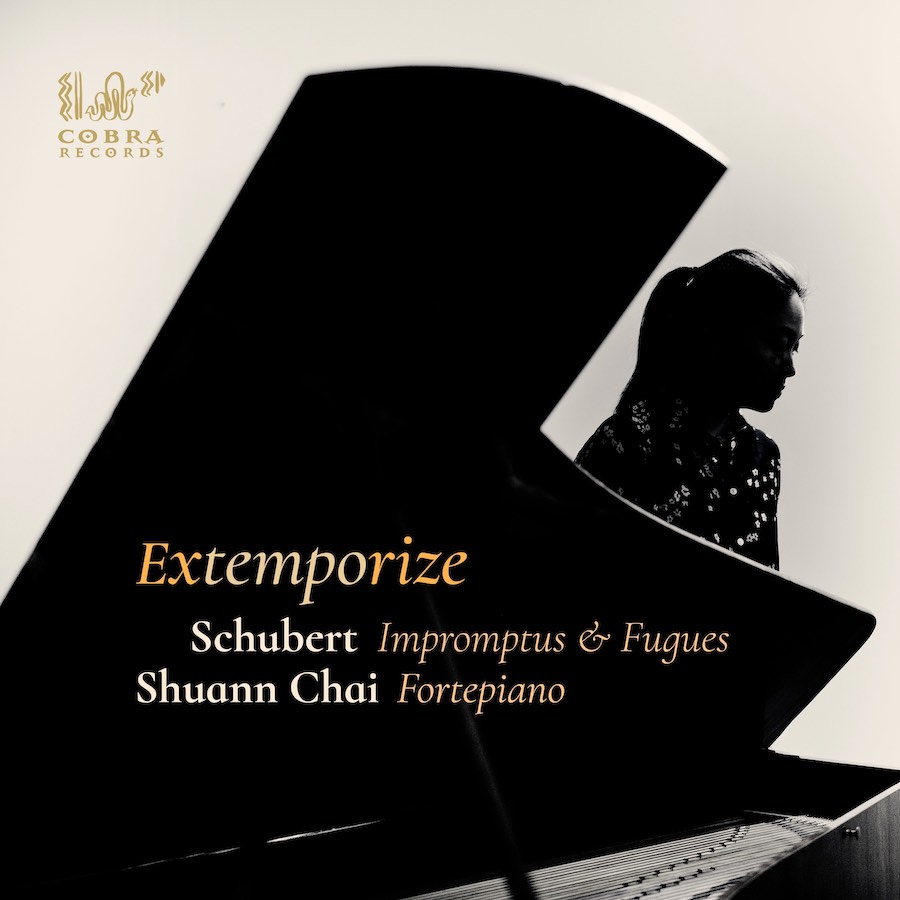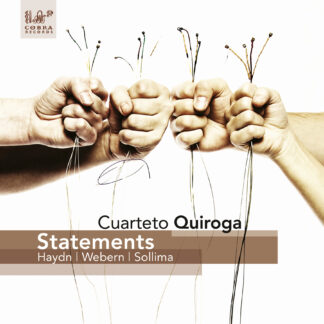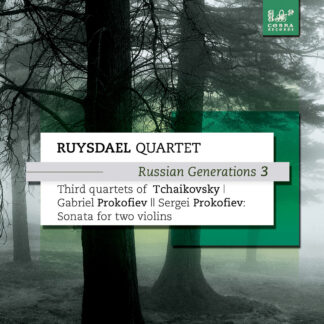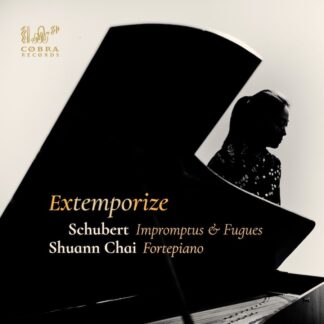Extemporize
€8.99 – €18.99
Available now as download.
Get it as High Res DSD download from NativeDSD
Listen to this album via this Streaming Link
Description
Extemporize
Schubert’s Impromptus are not without their quirks and curiosities, and Shuann Chai used this recording as an opportunity to delve deeper into them. In doing so she was also introduced to the two delightful Fugues (D 24a and D 24c ) that accompany the impromptus on this album.
Both sets of Schubert’s Impromptus (opus 90 and opus 142) were relegated to fringe status almost immediately after they were composed in the second half of 1827; only the first two pieces of opus 90 were ever published during Schubert’s lifetime. Opus 142 was roundly rejected for being too difficult and was only published in 1839, eleven years after the composer’s death. Times have changed, and the Impromptus are now firmly ensconced as cornerstones of the repertoire.
Schubert’s Impromptus drew Shuann Chai in because they are full of contradictions. An ‘impromptu’ suggests a piece that’s light in character, not too dramatic, not very long the opposite of, say, a sonata in four movements. While these Impromptus are musically very approachable, they are also powerful, often quite dark, deep, and pianistically challenging.
Also, the suggested element of improvisation is interwoven with a feeling of narrative. There are certainly moments of capriciousness or surprising modulations throughout, but the pieces themselves are very formally organized much more prescribed than what one would expect, say, in a ‘fantasy’. What intrigued her was this tension between spontaneity and structure, a paradox which Schubert exploits and expands to great dramatic effect.
This paradox can also be found in the Fugues on this album. Fugues and Impromptus are at first sight to very different forms of music: they are constructed in almost diametrically opposite ways, but artistically speaking, they are two sides of the same coin. Schubert’s fugues are searching for the freedom within their strict contrapuntal framework, and his Impromptus are works of imagination and great expression that are grounded by their formal architecture.
The album title, Extemporize, also has different sides. The dictionary defines ‘extemporize’ as “to speak or perform without prior planning; to act in an impromptu manner” (italics added), suggesting, again, improvisation and spontaneous expression. ‘Extemporize’ comes from the Latin ‘ex tempore’, which means ‘out of time’. Taken literally, that’s what happened to Schubert: he ran out of time dying at such a young age full of plans for the future.
Shuann Chai is a soloist and chamber musician who performs on a wide range of early to modern pianos, bringing the emotional content of music from the past to listeners in the present. Recognized by critics as “a graceful virtuoso”, she has been praised for performances that are “sensitive and communicative, …full of warmth an emotion.”
Recent projects include performances of the complete Beethoven Sonatas for Violin and Piano with Shunske Sato; giving masterclasses at CodArts Rotterdam and the Conservatory of Maastricht; and concerts in Japan, Taiwan, and several festivals in Europe.
Additional information
| Composers | |
|---|---|
| Genre | |
| Label | |
| Format | |
| Type | |
| Recording Location | Westvest90, Schiedam, The Netherlands |
| Recording Dates | 28, 29, 30 March 2023 |
| Producer, recording engineer | Ernst Coutinho |
| Mastering | Ernst Coutinho, Tom Peeters |
| Original recording format | DSD256 |
| Microphones | Bruel & Kjaer 4003, Neumann modified by Rens Heijnis |
| Cables | Acoustic Revive |
Press reviews
CD HotList, April 2024
…when a Schubert performer takes the fortepiano to its limits, she is illustrating what Schubert was up against in the early 19th century, and demonstrating how he managed those limits. None of this is to say that the fortepiano is the only “right” instrument for Schubert, just that it’s an instrument that can bring a particular kind of insight to his music. Of course, none of this works unless the right person is playing — and Shuann Chai is exactly the right person. She plays this program of eight impromptus (opp. 90 and 142) with obvious joy, and also with powerful stylistic insight.
De Volkskrant, 7 maart 2024
Elke pianist zal zeggen dat Schuberts muziek moet klinken alsof ze ter plekke ontstaat. Dat vindt ook Shuann Chai…Anders dan sommige collega’s maakt ze het ook waar. Op een Weense fortepiano uit 1820 roffelt en streelt ze Schuberts acht Impromptu’s tot leven…lang leve de frisse wind.
Classical Music Sentinel, February 2024
…the expressive warmth and dramatic touches that you hear are all created and imposed on the music by Shuann Chai’s direct input and the fortepiano’s response to it…Shuann Chai easily makes you lose sight of the fact that you are listening to a 200 year old fortepiano, and diverts your attention where it belongs, to the music itself.
Pizzicato, February 2024
This CD challenges just about everything we know about classical Schubert interpretation…Chai’s striking, accented, sometimes revolutionary playing is diametrically opposed to the cliché of the sickly composer...Thanks to Michael Rosenberger’s fortepiano (Vienna ca. 1850), the listener experiences a completely new Schubert sound universe, which could not be more expressive and stirring, more honest and unmistakable…By the end of this nearly 85-minute CD, you are guaranteed to see Schubert with different eyes and hear him with different ears. Highly recommended!
Diese CD stellt so ziemlich alles in Frage, was wir in Sachen klassische Schubert-Interpretation bisher kennengelernt haben…Chais markantes und akzentreiches, zum Teil revolutionäres Spiel steht dem klischeehaften Bild eines kränklichen Komponisten diametral gegenüber…Dank des Fortepianos von Michael Rosenberger (Wien ca. 1850) erlebt der Zuhörer ein komplett neues Schubert-Klanguniversum, das expressiver und mitreißender, ehrlicher und unmissverständlicher nicht sein kann…Wenn Sie diese CD mit ihren fast 85 Minuten zu Ende gehört haben, werden Sie spätestens dann Schubert garantiert mit anderen Augen sehen und mit anderen Ohren hören. Unbedingt empfehlenswert!






John McLaren –
Beautiful performance. Exquisite interpretation. A wonderful addition to my Schubert classical collection.